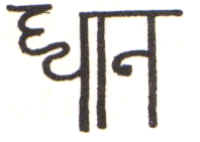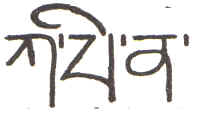|
SANSKRIT LESSON

Mahakapphinena ca,
1
"and Mahakapphina,"
(cont. from issue
#53) by,
Bhiksuni Heng Hsien
The Buddha's disciple
 Mahakapphina2
was king of Southern Kosala before he became a Bhiksu. Mahakapphina2
was king of Southern Kosala before he became a Bhiksu.  Kapphina was his monastic name.3 Originally his parents
named him for a naksatra "asterism,"4 one
associated with Scorpio,5
Kapphina was his monastic name.3 Originally his parents
named him for a naksatra "asterism,"4 one
associated with Scorpio,5 to
whom they had prayed for his birth. Mahakappina eventually became the foremost
of the Buddha's disciples in understanding of astrology. to
whom they had prayed for his birth. Mahakappina eventually became the foremost
of the Buddha's disciples in understanding of astrology.
After Mahakapphina had left the home life and
while he was still on the road going to find the Buddha in order to be ordained,
the Buddha sent a transformation body to speak the Dharma for him. Mahakapphina
heard the Dharma and attained one of the fruits of Arhatship
"overnight."6 He then especially enjoyed the
bliss of  dhyana,7
constantly uttering aho sukham aho sukham, dhyana,7
constantly uttering aho sukham aho sukham,  "ah
bliss, "ah
bliss,
ah bliss!" It was therefore very appropriate for the great Arhat
Mahakapphina to be present in the Dharma assembly at the time when Sakyamuni
Buddha was about to speak the  Sukhavativyuha-Sutra,8
the Sutra of the Land of Ultimate Bliss. Sukhavativyuha-Sutra,8
the Sutra of the Land of Ultimate Bliss.
1 Mahakapphinena ca appears after
Mahakasyapena ca and before Mahakatyayanena in Max Muller's Sanskrit. We have
emended the word order on the basis of the Chinese text.
2
 ta1 chieh2 pin1
na4.
ta1 chieh2 pin1
na4.
3
0ne explanation of his name meaning
 huang2 t'o2 "yellow head"
relates it to the Sanskrit word huang2 t'o2 "yellow head"
relates it to the Sanskrit word kapila "tawny." Tibetan transliterates
as ka-pi-na. kapila "tawny." Tibetan transliterates
as ka-pi-na.
4 See Vajra Bodhi Sea #47
5
 fang2 hsiu4, "house star." fang2 hsiu4, "house star."
6 Perhaps in a "night's
lodging," another meaning of the character  ,
then ,
then
pronounced su4. Pronounced hsin3 the same character
also means "a night."
7
The word dhyana pronounced Middle-Indic
fashion jhana comes into Chinese as the word  ch'an
and from Chinese into Japanese as zen. ch'an
and from Chinese into Japanese as zen.
8 Sukhavati contains the word
sukha(m)
"bliss." See Vajra Bodhi Sea #24
|